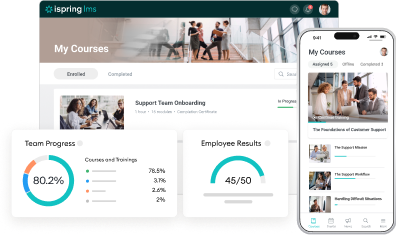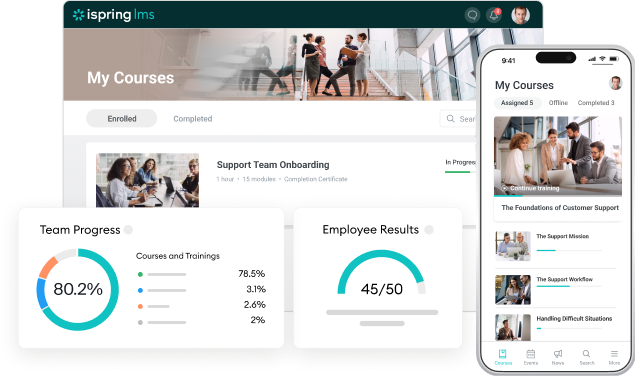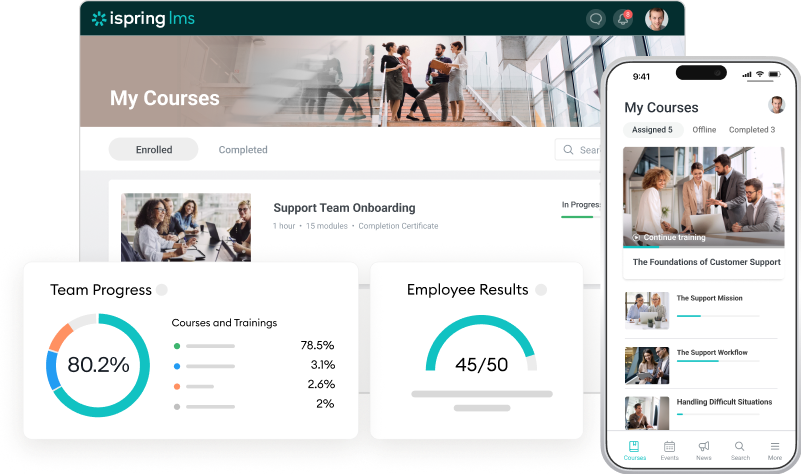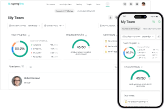LMS Support Services That Actually Solve Users’ Problems

Implementing a Learning Management System is a strategic move for organizations that want to enhance training efficiency and employee development. However, the true value of an LMS is realized not just through its features, but through the quality of support services accompanying it. Effective help desk channels — such as phone, email, live chat, comprehensive FAQs, and knowledge bases — are pivotal in addressing user concerns promptly and ensuring an uninterrupted training experience.
According to the 2025 statistics & trends, 67% of users prefer LMS vendors that offer comprehensive functionalities, while 66% desire better customer and technical support. It’s about the feature set and technical support being equally important when choosing a learning platform.
TL;DR
The article explains that implementing an LMS delivers value only when paired with strong support services, as users increasingly demand reliable customer and technical help. It outlines common support issues such as slow responses, integration difficulties, and a lack of post-launch assistance, and describes various support channels, including live chat, phone, email, FAQs, knowledge bases, forums, and webinars. Beyond help desk options, effective LMS support also covers onboarding, strategic consulting, maintenance, and administrative help. The piece concludes by advising organizations to evaluate a vendor’s support availability, scope, and pricing to ensure the LMS meets their needs.
The Most Common Support Issues
Many companies run into the same frustrating issues that slow down deployment, increase costs, and leave users feeling frustrated. Ensuring that your Learning Management System (LMS) operates reliably 24/7 is essential to maintaining an uninterrupted learning experience for employees.
According to support statistics from the iSpring team, here are the top five reasons customers reach out to technical support:

Let’s face it, working in an LMS can be challenging when reports aren’t set up properly or you can’t upload user data. That’s why, when choosing an LMS vendor, it’s crucial to pay close attention to the quality of their support services. Here are the most common pitfalls to watch out for:
- Slow or unhelpful support
You reach out to the help desk expecting a quick fix when access is down or reports aren’t working. But instead of getting timely help, you wait for days only to receive a useless, generic reply. Meanwhile, training is delayed. - Difficult rollout and integration
Setting up the learning management system and connecting it to other systems (like HRM, CRM, or SSO) ends up being far more complicated than promised. Tasks that should take days stretch into weeks. Instead of streamlining your processes, the LMS adds friction, rework, and frustration. - No post-launch support
Once the LMS is deployed on your servers, the LMS vendors fade into the background. You’re left handling updates, scaling, and content adjustments on your own. Without strategic input or tech backup, your software stops evolving and slowly becomes outdated, becoming vulnerable to security risks or not aligned with business needs.
How Different Types of LMS Support Address Issues
Effective ongoing support involves utilizing a variety of communication channels to meet the diverse needs of different users. As part of our research for this article, we reached out to the technical support team to analyze the types of LMS support service requests that are made and to determine which communication channels are most effective for resolving issues. Here’s what we found:
- Emails: 35%
- Phone calls: 16.2%
- Live chats: 13.5%

Let’s explore how modern eLearning platforms implement different channels to ensure seamless customer experiences.
#1. Live Chat
At iSpring, we understand that timely support is crucial for smooth training and administration. That’s why we offer 24/7 support, including live chat, with genuine experts available anytime-day or night, weekends, and holidays. Whether it’s a learner encountering an issue accessing a course or an admin needing help with setting roles, our support team is always ready to provide quick and effective solutions. No automated responses — just skilled professionals focused on resolving issues promptly and efficiently. With live chat, users get the answers they need right away, minimizing downtime and improving the overall experience.


#2. Phone
While digital communication is essential, phone support remains a trusted method for many, especially when immediate, more personal assistance is required. Some LMS vendors, like TalentLMS, offer phone hotlines for urgent matters such as access recovery or troubleshooting technical issues. Phone support is invaluable when personal interaction is needed to quickly clarify complex situations and provide real-time solutions.

#3. Email
Email continues to be a staple for more in-depth communication. It’s an effective channel for addressing complex issues, sharing documents, or providing guidance on system integrations. Leading LMS vendors, including Litmos, use email to handle ongoing interactions and technical advice. Users can send an email through the Client Support Portal, even if they’re using a free trial. Communication via email also allows for a thorough documentation of issues, making it easier to track progress and maintain a clear record of the solutions.

#4. Frequently asked questions (FAQ)
FAQs can be incredibly handy in resolving common questions without overwhelming the help desk. For example, Absorb LMS maintains a comprehensive FAQ section covering issues from registration to course creation and customization. Such a resource allows both new and experienced users to find solutions quickly, saving time and reducing the need for direct human intervention.

#5. Knowledge base (KB)
A well-structured knowledge hub is indispensable to help users leverage the capabilities of their LMS to the fullest. At iSpring, we provide an extensive knowledge base that offers step-by-step guides and tutorial videos on system features, tips for creating effective courses, and troubleshooting instructions. This helps clients quickly familiarize themselves with the software, empowering them to resolve common issues independently.

#6. Forums
Some LMS platforms, such as Docebo, offer community forums where users can share experiences, solve problems collaboratively, and exchange best practices. Community-driven assistance is a valuable addition, allowing customers to tap into a wealth of experience and reduce the pressure on official help channels. By participating in these communities, users can gain insights into common challenges and get practical solutions from peers.

#7. Webinars and Online Training
Webinars are an excellent way to provide customers with ongoing education, updates, and best practices. For instance, Skillsoft regularly hosts webinars focused on the latest industry trends, innovations in online learning, and tips for LMS implementation. These webinars not only enhance users’ skills but also motivate them to continuously improve their expertise.

Beyond the Help Desk: What Else Matters in LMS Support?
While help desk channels like chat, email, and phone are crucial for resolving day-to-day issues, there are several deeper layers of LMS support services that can make or break your user experience. These aspects often reveal themselves only after implementation — and a responsive, experienced support team can make the difference in each case.
Launch and onboarding
Deploying an LMS isn’t just about switching the system on. You need help mapping out user roles, setting up departments, organizing course catalogs, and configuring bulk invitations and reminders. A help desk with a high level of expertise will walk you through each step — saving hours of trial and error and preventing common misconfigurations that stall adoption.
Strategic consulting
A good LMS partner does more than fix bugs — they help you build a learning ecosystem. With the right guidance, you can connect learning programs to performance metrics, align training to business goals, and create internal certification paths. This kind of assistance turns your learning management system from a content host into a true driver of employee development.
Regular maintenance
Power outages and data loss can stop operations cold in their tracks. A proactive support team continuously monitors system performance, applies updates with no downtime, and backs up critical data. This behind-the-scenes work often goes unnoticed — until it saves the day.
Administrative support
Admins play a vital role in your LMS because they can easily bulk edit users, reuse course templates, or generate detailed reports with just a few clicks. Good backup equips admins with the tools and guidance they need to keep things running efficiently — and to solve problems as soon as they arise.
How to Choose a Vendor with Reliable Support
Not every company needs the same level of LMS support services. The right amount depends on the complexity of your setup, your internal resources, and how critical the LMS is to your operations.
Here are three key factors you should consider before you commit:
- Availability and response times: Will you be able to get help during non-business hours? What are the SLA terms? Ask about average first-response times, 24/7 assistance availability, and which channels are fastest. For global or remote teams, around-the-clock help can be a deal breaker.
- Support coverage and depth: If you choose an on-premise LMS, find out how much help you’ll actually get. A small startup might only need help with setup and minor changes, while a large company with multiple branches will require more complex onboarding, custom integrations, and scalable architecture planning.
- Pricing and what’s actually included: Some LMS vendors bundle ongoing support services into the subscription fee, while others charge separately for onboarding, technical consulting, or API assistance. Request a breakdown of what’s included, and ask for a rate card or list of premium services to avoid unexpected charges down the road.
Frequently Asked Questions
Even with a clear understanding of LMS support channels, you might still have some questions. Here are quick answers to common concerns that come up when choosing LMS vendors.
How can I tell if an LMS vendor offers good support?
Look for LMS vendors that respond quickly, guide you through every stage of adoption, and offer clear, practical guidance. Other good signs include transparent pricing, multiple ways to get in touch, and positive reviews from actual clients.
Is support included in the LMS price?
Basic LMS support services, such as help with common issues and routine updates, are usually a part of the subscription. However, more advanced services, such as system customization, integrations, or strategic consulting, may come at an extra cost, depending on the vendor.
Your LMS Journey Deserves a Trusted Partner
Choosing an LMS is not just about features — it’s about the experience you get every day after launch. iSpring LMS combines powerful tools with truly responsive, human-centered support that’s available 24/7. From onboarding to scaling, our team is here to help you succeed at every step. Get a free demo and experience the difference that personalized support makes.






